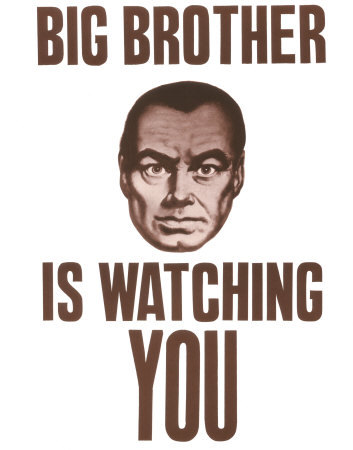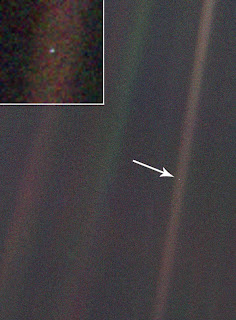Seems
that almost every day lately, we hear of some new way we didn't know about in
which "Big Brother" is watching us. Take this example from The Pacific Northwest Inlander, July 23, 2013:
 |
| [Photo: Young Kwak] |
A steady beeping sounds as Spokane Police Officer Dan Cole cruises down Monroe Street.
Equipped with an automatic license plate reader, his patrol car snaps a photo
of every vehicle he passes, recording plate numbers, times and GPS locations.
Each beep signals a
new license plate being scanned and instantly checked against a statewide
database of “flagged” stolen or suspect vehicles.
“I drive around all
day with the beep,” Cole says, logging several thousand scans in a shift. “I
don’t even notice anymore.”
Any suspicious license
plates trigger an alert for the officer, but all vehicles — flagged or not —
get logged into an extensive SPD database. As Cole patrols his beat, his reader
compiles a sweeping snapshot of local drivers and parked vehicles along his
route.
With Spokane’s infamous auto theft problems,
police officials consider the plate readers an invaluable tool for recovering
stolen vehicles, finding wanted suspects or gathering intelligence on criminal
comings and goings.
But while local law
enforcement agencies hope to expand their use of plate reader technology, the
American Civil Liberties Union last week voiced new concerns about the rapid
proliferation of such systems. In a new study called “You Are Being Tracked,” the ACLU warns plate readers give
police an unprecedented and overly broad record of who goes where.
“Ordinary people,” the
ACLU states, “going about their daily lives have every right to expect that
their movements will not be logged into massive government databases.”
Within the past few years, hundreds of local, state and federal agencies have adopted
plate reader technology. The Spokane Police Department and Spokane County
Sheriff’s Office now run three mobile plate readers mounted to patrol cars. The
scanned plate data feeds into a joint server, which both departments can search
for driver and location information.
Idaho law enforcement
agencies for Post Falls, Coeur d’Alene
and Kootenai County also operate a joint system made
up of three mobile units, as well as nine stationary plate readers fixed along
Interstate 90 and other high-traffic streets.
“It’s a very
beneficial program to have,” Spokane Police Cmdr. Joe Walker says. “There’s a
lot of uses for it. … That’s why we’re trying to do more.”
Much of the criticism
against readers stems from the broad dragnet cast as they scan vehicles. For
every worthwhile “hit” on a suspicious plate, the readers scan and record
thousands of other law-abiding drivers.
Every license plate
scanned — hit or not — gets logged into a searchable database with a record of
the time, location, plate number and a photo of the vehicle. Chances are, if
you’ve driven Interstate 90 by Post Falls or passed a mobile reader in downtown Spokane, your data is in
the system.
In April, a single
Spokane Police plate reader scanned more than 46,900 vehicles. Records show
just 310 plates registered a hit, a success rate of .66 percent. But most were
false hits on bad scans or out-of-state plates with the same numbers as Washington plates on the
watch list.
During a recent
three-month period, Spokane Police readers scanned more than 123,400 plates,
the department reports, resulting in 30 recovered stolen vehicles and three
sets of stolen license plates.
Despite the minuscule
hit rate, police say plate readers have accelerated stolen vehicle recovery,
located dangerous suspects and cracked important cases. Patrolling officers can
flag plates for vehicles of interest in local crimes. Investigators can also
position readers near a crime scene to track who moves in and out of the area,
gathering potentially vital intelligence.
Post Falls Police
Chief Scot Haug says the readers often provide other important community
searching functions — finding missing persons, scanning for Amber Alert
vehicles or locating drivers with outstanding warrants.
“The technology is
saving lives,” Haug says. “We have literally dozens and dozens and dozens of
cases that I think would not have been solved [otherwise].”
Jamela Debelak, technology director for the ACLU of Washington, says
license plate readers can serve as a legitimate law enforcement tool, but they
primarily track law-abiding drivers without their knowledge. Many citizens
remain unaware of the technology or its implications.
“With any type of
surveillance technology, part of the problem is we don’t know about it,” she
says. “If you don’t have knowledge of what the government is collecting and
tracking, you’re not going to be upset.”
Debelak says massive
police databases open the door for institutional abuses. Police could monitor
the movements of local activists, officials or journalists, piecing together
their driving routines from various reader scans. In New York City, officers reportedly patrolled
around mosques to make a record of people attending services.
“Information about all
of our driving habits is being stored,” she says. “If there’s no hit, there’s
no reason to be storing this information on innocent drivers.”
Few states have
regulations on how plate readers can be used, Debelak says. Individual agencies
set policy on who can access the collected data and how long the information is
kept.
Spokane agencies keep plate data for 90 days
unless a specific plate is deemed significant to an ongoing case. Meanwhile,
local Idaho
agencies keep all plate reader data going back to the start of the program in
2007.
“We retain data
indefinitely,” Haug says. “We’ve found that the data is very valuable even a
year or two down the road.”
Debelak argues driver
data should only be kept as long as necessary to be useful — days or weeks
instead of years. Many drivers may shrug off the surveillance, thinking they
have nothing to hide, but she says that doesn’t mean the information couldn’t
be used against them in unforeseen ways in the future.
“In our society,” the
ACLU states, “it is a core principle that the government does not invade its
citizens’ privacy and store information about their innocent activities just in
case they do something wrong.”
Mobile plate readers, which cost about $21,000 each, have operated locally with
little complaint in recent years. Spokane Police Chief Frank Straub has praised
their successes, suggesting the department may soon look to install stationary
units around the city. In Post
Falls, Haug calls plate
readers the most important law enforcement tool since DNA testing.
Spokane City Council
President Ben Stuckart says he has ridden with an SPD mobile plate reader and
witnessed firsthand how effective can be.
“They’re very
functional,” he says. “They provide a very good service.”
Stuckart recently introduced an ordinance to require extra council review of any
new police surveillance technology such as drones. He says new stationary readers
would require review, but he has no problem with the current units.
Spokane Police
Ombudsman Tim Burns also reported his office had not received any complaints or
concerns about the local use of plate readers. He called them “amazing
technology” that should be used with care.
“The
big question is how is it used,” he says. “Not everybody is a criminal.”
----------
I didn't know our local law enforcement was using this technology.
It's Orwellian, in concept and scope, for free & innocent citizens to have
their movements recorded. Be aware... and wary. Your local law enforcement may
be using it also. Traffic light and speed trap cameras, the NSA snooping scandal,
drones overhead, Google search records opened up... now this. Where does it end? Do I think our government is out to get us? No. The
government is ambivalent of what you do. However, the government is made
up of individuals, groups and agencies. The majority are well-intentioned
(and the road to hell is paved with good intentions.) Some are
incompetent. And a few are malevolent. Many, perhaps most, people will not care. Many are far too bothered to learn their rights, much less speak up for them. They are too worried about who wins at American Idol or when the next episode of "Honey Boo Shore" comes on...Learn to stand up for your rights, or learn to Love Big Brother! (And I don't mean the stupid TV show...)

















